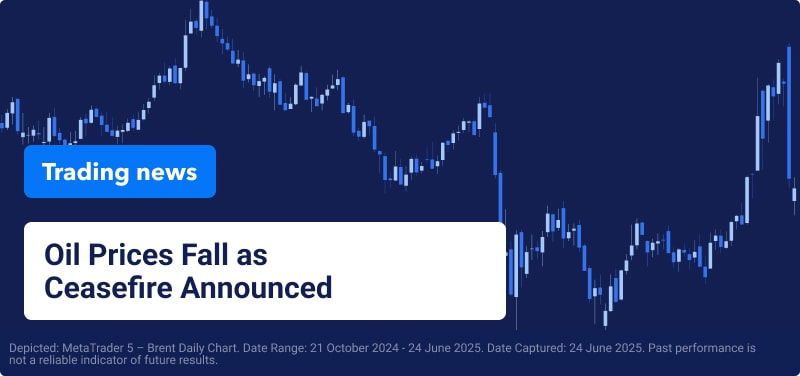Iran And Israel Agree Ceasefire After 12 Days Of Conflict

On Tuesday morning, hours after Iran launched an attack on a US military base, Iran and Israel agreed a ceasefire. Let’s take a look in more detail at the events of the last 48 hours and the market reaction.
Ceasefire Follows Iranian Strike on US Base
Over the weekend, after much speculation, the US intervened in the conflict in the Middle East.
Early on Sunday local time, the US bombed three nuclear sites in Iran – Fordow, Natanz and Isfahan. President Donald Trump was quick to announce that “the strikes were a spectacular military success” and threatened further action if Tehran did not make peace.
The question now was how Tehran would respond to the US intervention. Following the attack, Iran's Foreign Minister Abbas Araghchi stated that the US had “crossed a very big red line” and that Tehran had a “variety of options” in terms of a response.
Eventually, on Monday evening, Tehran launched a missile attack on a US military base in Qatar. However, it transpired that Iran had given prior warning of its attack and Qatar claimed that its air defence systems had successfully intercepted all missiles.
Iran's measured response, in which it launched the same number of missiles as the number of bombs the US dropped on Sunday, was viewed by many as a sign of potential de-escalation in the conflict.
Sure enough, just hours after Iran's retaliation, on Tuesday morning, President Trump declared on social media that Iran and Israel had agreed to a “total ceasefire”. Not long after, news of the ceasefire was repeated on Iranian state television before being confirmed by Israel.
How the Markets Have Reacted
On Monday, Asia-Pacific equities mostly declined, with European stocks following suit, as the US attack on Iranian nuclear sites hit sentiment.
However, Wall Street, which was still trading when Iran launched its retaliatory strike against the US base in Qatar, closed higher. The Dow Jones, Nasdaq Composite and S&P 500 posted gains of 0.89%, 0.94% and 0.96% respectively.
Throughout the conflict, the asset most in the spotlight has been oil.
As market participants tried to gauge Iran’s response to Sunday’s attack, one consideration was the possibility that Iran might attempt to close the Strait of Hormuz, through which about a fifth of the world’s oil supply passes.
Any such closure would surely send energy prices surging, and this contributed to oil prices spiking when markets opened on Sunday evening.
Global benchmark Brent crude opened sharply higher, hitting a session high of $79.40 a barrel. However, as news broke of Iran’s retaliatory strike, prices tumbled, with Brent closing Monday's session at $70.52 a barrel.
As already mentioned, Iran’s response to the US was viewed as de-escalatory, which explains the positive reaction in US stocks and the simultaneous drop in oil prices.
On Tuesday morning, following news of the ceasefire between Iran and Israel, oil prices have dropped sharply once again. At 10:30 (GMT+1), Brent was trading more than 3% lower at around $68.30.
Stocks, on the other hand, were moving in the other direction. Asia-Pacific markets were all trading higher, and European equities jumped at the opening bell.
What to Look Out for This Week
After a volatile start to the week, what else should investors look out for this week?
Following the Federal Reserve’s decision last week to leave interest rates unchanged, Fed Chair Jerome Powell will provide Congress with an update regarding the central bank’s views on inflation and the economy. He is scheduled to testify before legislators on both Tuesday and Wednesday.
Other important events this week include:
- FedEx Quarterly Earnings on Tuesday
- US CB Consumer Confidence June on Wednesday
- US Crude Oil Inventories on Wednesday
- GfK German Consumer Climate July on Thursday
- US GDP First Quarter Final on Thursday
- Nike Quarterly Earnings on Thursday
More By This Author:
US-China Trade Talks Continue Into Second DayWall Street Gains On “Positive” EU-US Trade Talks
Wall Street Shrugs Off Moody’s Downgrade
Disclaimer: This material does not contain and should not be construed as containing investment advice, investment recommendations, an offer of or solicitation for any transactions in financial ...
more


